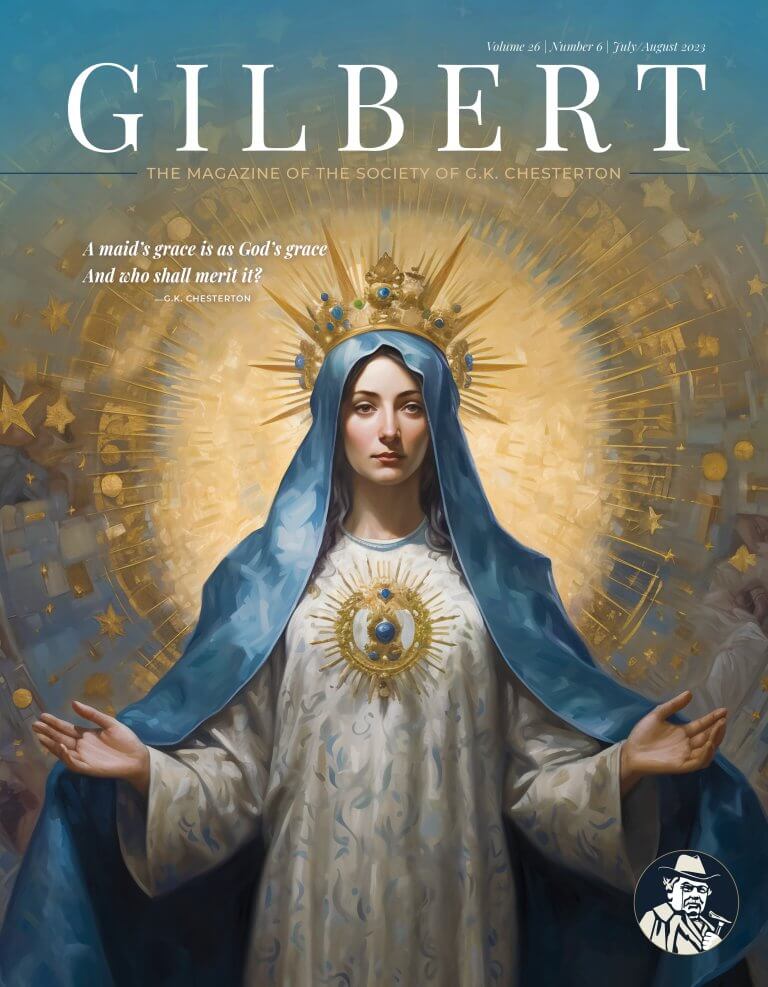Nobody realizes (or anyhow admits) that our mechanical civilization is on the verge of the abyss. (G.K.’s Weekly, Jan. 7, 1928)
A friend of mine asked ChatGPT to write an essay listing the villains from G.K. Chesterton’s novels. I’m not sure why he thought this was an exercise worth undertaking, but in any case, he sent me the results. Number One on the list? “Dr. Alquist – The Man Who Was Thursday: Dr. Alquist is a scientist who becomes the central figure in the anarchist conspiracy in the novel. He is involved in a plot to overthrow the established order and create chaos.”
Some of you are thinking, “Why did ChatGPT spell Dale’s name wrong?” Yeah, I thought that, too. But then I realized that I am actually not a character in Chesterton’s famous novel, nor is there any character named Alquist in any of his novels. Why didn’t the stupid AI know that? The answer, as my friend pointed out, is that Chesterton and I are merging in the minds of AI’s. My enemies will cheer that I’ve been identified as a villain. And cheer even louder that my name has been misspelled (Such is the logic of my enemies).
Ironically, there is a character named Alquist in the 1920 play R.U.R by Czech playwright Karel Capek. The initials in the title stand for “Rossum’s Universal Robots,” The word “Robot” was Capek’s invention. And the man-made men in the play end up destroying almost all of the God-made men. But ironically (and disappointing for my enemies’ sake) Alquist is perhaps the only redeeming character in Capek’s play.
Capek got the idea for robots from none other than G.K. Chesterton, of whom he was a great admirer. In his Father Brown story, “The Invisible Man,” Chesterton describes huge headless iron dolls that serve as butlers, maids, and cooks, and who are, chillingly, suspects in the murder of the rich man who invented them.
Robots have gone from science fiction to everyday fact. I was surprised to learn recently that in South Africa, traffic lights are called “robots.” But then I realized that this makes sense: robots are mechanical servants: devices that perform functions once performed by humans, and thereby replaced humans. Traffic lights replaced traffic cops. Few would argue this is a bad thing. Except most days. Especially when you’re trying to make a left turn. We could argue that traffic laws are pro-life legislation, which try to save lives, but traffic lights are anti-human.
Labor saving devices always come with a price. “The human race,” says Chesterton, “is always trying this dodge of making everything entirely easy; but the difficulty which it shifts off one thing it shifts on to another.” We are seeing this again with the continued development of machines and computer programs that are doing more and more things that were once only done by human beings. But getting rid of old difficulties always creates new difficulties.
The word “science” still has a magical hold over the world. It means progress, so it can’t be stopped. It means mathematical certainty, so it can’t be argued with. It means institutional authority, so it can’t be questioned. But Chesterton pops that balloon and says quite correctly that science is either a tool or a toy. It is a tool when it performs some labor for us, which may include surgery, harvesting, flying, or flushing. It is a toy when we amuse ourselves with it, which may include listening to recorded music or looking through a telescope. We can also build machines that amaze by how human they might look or act or even paint or write. But mimicking humans is a monkey thing to do. And it’s all fun until somebody loses an eye. It wasn’t one of Mr. Smythe’s Silent Servants who murdered him in Chesterton’s “The Invisible Man,” but we are reminded that in Edgar Allen Poe’s foundational mystery novel, Murders in the Rue Morgue, an ape was the murderer. But the ape had been trained by a human to do the dastardly deed. In R.U.R., robots kill humans. But the robots had been designed and built by humans. HAL is a murderous computer in 2001: A Space Odyssey, but in the sequel, 2019, the computer’s creator exonerates the HAL as simply being programmed badly, and defends the computer’s innocence … and intelligence. And there’s the rub.
Chesterton says, “A moral problem and peril appears with every new invention.”
In schools, teachers are already seeing students sloughing off ChatGPT papers as their own original work. Right now, they’re pretty easy to spot. They have a soulless quality to them. But even souls will be imitated as the software gets more sophisticated. But there is less reason to believe that the students will get more sophisticated.
My concern is not artificial intelligence in machines, but rather unnatural ignorance in humans. Chesterton says thinking is hard work, and most people would rather avoid it. But we are going from letting other people think for us to letting machines think for us. The frightening prospect is that ultimately it’s the same thing. There are still people behind the curtain, and the few who control the machines will control everything else if we depend on both their tools and their toys.
ABOUT DALE AHLQUIST
Dale Ahlquist is President of The Society of Gilbert Keith Chesterton, a worldwide lay apostolate dedicated to Catholic education, evangelization, and the social teaching of the church. He leads the Society’s Chesterton Schools Network, which exists to inspire and support the creation of joyfully Catholic, classical, and affordable high schools around the world. Learn More






